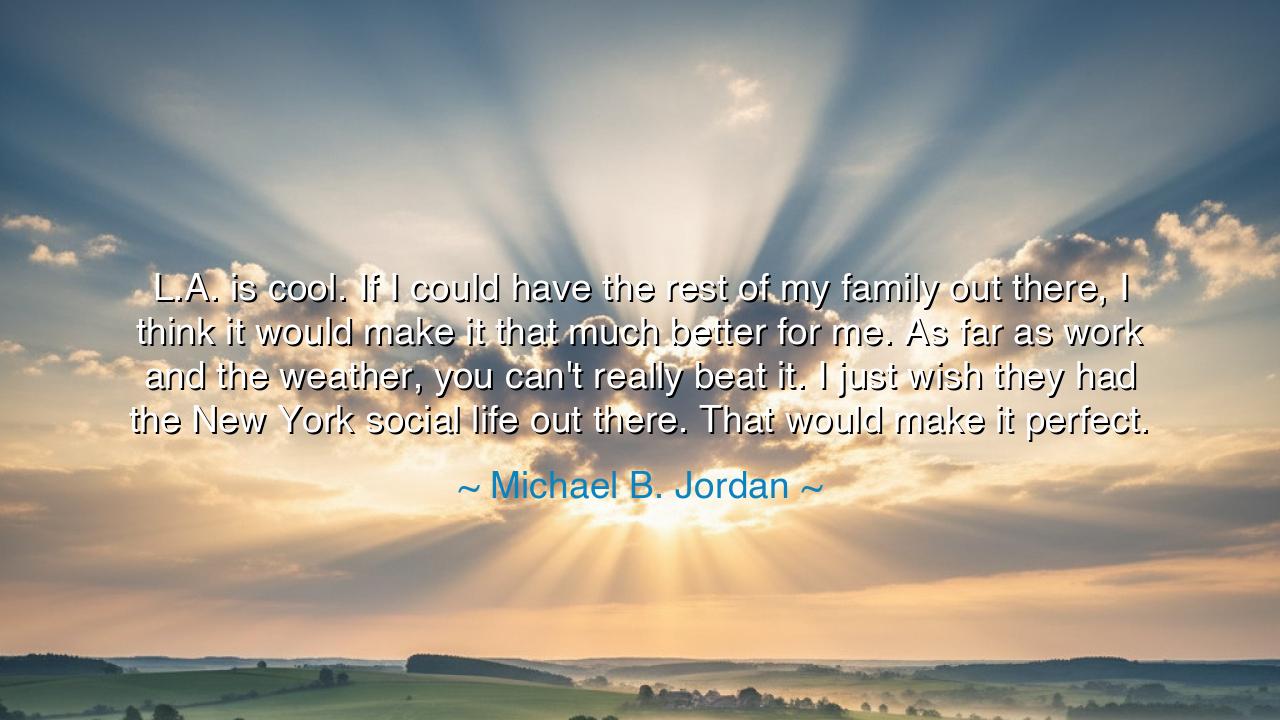
L.A. is cool. If I could have the rest of my family out there, I
L.A. is cool. If I could have the rest of my family out there, I think it would make it that much better for me. As far as work and the weather, you can't really beat it. I just wish they had the New York social life out there. That would make it perfect.






"L.A. is cool. If I could have the rest of my family out there, I think it would make it that much better for me. As far as work and the weather, you can't really beat it. I just wish they had the New York social life out there. That would make it perfect." These words from Michael B. Jordan reflect the balance between external conditions and personal fulfillment. Jordan speaks not only of his appreciation for the opportunities and comfort that Los Angeles provides but also of his longing for something more—an element of connection and community that he feels is missing. His desire for the New York social life in L.A. speaks to a universal truth: that location and circumstance alone are not enough to bring happiness; personal relationships and a sense of belonging are equally essential to a well-rounded life.
In the ancient world, Aristotle recognized that human beings are social creatures, and no matter how rich the environment, we are still shaped by the community around us. In his work on ethics, he argued that the ultimate goal of human life, eudaimonia (often translated as flourishing or happiness), is achieved not only through personal virtue or external conditions but through meaningful relationships with others. Just as Michael B. Jordan longs for the New York social life in Los Angeles, so too did the ancient philosophers understand that true contentment requires a harmonious blend of personal success and social connection. Without the latter, the former can feel incomplete.
Consider the story of Cicero, the great Roman orator, who spent much of his life in public service, moving between the intellectual circles of Rome and the solitude of his estates. Cicero loved the bustling life of Rome, with its intellectual debates, political drama, and vibrant social scene. Yet, despite his many achievements, he often found himself yearning for true companionship—something deeper than mere political alliances or societal accolades. His letters are filled with a longing for genuine connection with his friends and family, a desire to find peace and meaning beyond the frenetic pace of Roman life. Like Jordan, Cicero understood that true happiness is not simply the result of favorable circumstances, but of the richness of relationships that infuse meaning into every experience.
Michael B. Jordan’s reflection on L.A. and New York reveals a common tension that many experience: external circumstances, such as the allure of great weather and career opportunities, may provide comfort, but they cannot replace the vibrancy of meaningful connections with others. The weather in L.A., with its year-round sunshine, is often regarded as ideal, and the work opportunities in entertainment may be unmatched. Yet, for Jordan, there is something about the social life in New York—the energy, the interaction, the sense of community—that L.A. lacks. This yearning for a sense of belonging in an ever-changing environment is a reflection of our shared human need for connection.
In ancient Greek culture, Athens and Sparta were two cities that epitomized this tension between external conditions and internal needs. Athens was the birthplace of philosophy, art, and intellectual flourishing, while Sparta valued military strength and discipline above all. Yet, despite the splendor of Athens, many found the Spartan way of life—where community was tightly bound by shared purpose and values—more fulfilling. The social life in Sparta, though simple and austere, provided a sense of togetherness and strength that Athens, with all its artistic and intellectual grandeur, could not offer. In this sense, Jordan's longing for a social life similar to New York’s is a reflection of this ancient debate—what truly nourishes the human spirit: the pursuit of personal success or the cultivation of meaningful relationships?
The lesson to be drawn from Michael B. Jordan’s quote is clear: balance is key to personal fulfillment. It is not enough to surround oneself with favorable conditions—be they successful careers, ideal environments, or luxurious living—if one is lacking in social connection and personal bonds. Eudaimonia, or true happiness, comes when we can merge the external with the internal, cultivating not only professional success but also deep and lasting relationships that nurture our emotional well-being. Just as Aristotle and Cicero understood, true happiness comes from the integration of all aspects of life, not from the perfection of one alone.
In practical terms, this means we must focus on cultivating meaningful connections alongside our professional and material pursuits. Whether in our personal lives, careers, or creative endeavors, we must strive for a harmonious balance that nurtures both our individual ambitions and our need for genuine social interaction. Like Michael B. Jordan, who seeks both the beauty of L.A.’s opportunities and the richness of New York’s social scene, we too must learn to balance our environments and connections to create a life that feels truly fulfilling. Let us recognize that community and connection are as vital to our happiness as any external success or achievement, for without them, even the most beautiful surroundings will feel empty.






AAdministratorAdministrator
Welcome, honored guests. Please leave a comment, we will respond soon